|
La Favorite - Teatro Real Madrid
|
| |
Teatro
Real Madrid (ESP), Premiere April 13, 2003
La
Favorite
Text:
Birgit Popp, Photos:
Javier de Real
|
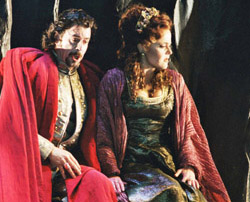
Carlso Álvarez und Sonia Ganassi
|
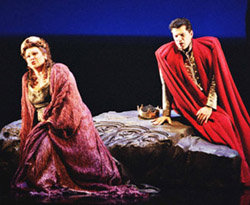
Dolora Sajick und Manuel Lanza
|
|
With
Donizetti's 1840 at the Paris Opéra first performed La Favorite the
opera had its premiere at Madrid's Teatro Real on April 13, which had
inaugurated - though in the altered Italian version - this opera house
in 1850. Till the beginning of the 20th century Donizetti's masterpiece
belonged to one of the most performed operas in the world and had a
triumphal success. This does not surprise, since it owns a grandiose
richness in melodies, whose basic tendency is coined by dramatic
situations. Donizetti and his librettists around Eugène Scribe
succeeded to create a rousing mixture of monks chorals, lyrical arias
and duets and under the skin going cursing scenes.
Regarding
the musical style La Favorite is a connecting link between former and
upcoming opera works and leads especially to Verdi. For example the
lovely choir of the ladies in waiting in the second scene of the first
act can be found later in similar form in the choir of the ladies in
waiting in the second act of Verdi's Don Carlos. But, not only Verdi
reminds about Donizetti, also in Donizetti's opera can be found bond
issues, so to Rossini or Meyerbeer, but as well to Donizetti himself. As
example might be taken the prelude to the second act of La Favorite,
which reminds strongly at the three years before first performed prelude
of the last act of Donizetti's Roberto Devereux, when the protagonist
has to go to the execution of his death sentence.
Fortunately,
today the performance of the French version has re-established, whose
contents is not only better but which is also musically more subtle.
Donizetti has taken great care to let slip in his music the elegance of
the French language and diction. But, not just Donizetti's melodies
enchant still today, also the contents of La Favorite, which presented
explosive issues for Donizetti's time and therefore could be performed
in an uncensored version only at the more liberal Paris, still owns
actuality: A priest must leave the church because he fell in love with a
woman. The mistress, who had believed the man that he would leave his
wife and marry her. At the end she is always fed with hopes, since the
man plays with the thought of divorce, but never does the step. The
stubborn reaction of the king, who cannot be anymore sure of the love of
his mistress, but nevertheless does not want to bow to the decree of the
church. Fernand's moment of madness, which can be still understood today,
in a time, in which the honor does not play an as important role anymore
as at the time of Alphonse XI. in the 14th century or at
Donizetti's time in the 19th century. Hurt feelings still
lead to the point that reasonable
arguments are not listen to.
|
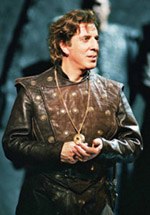
|
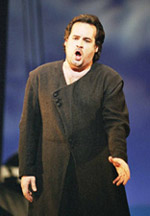
|
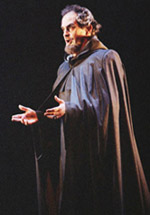
|
Raúl Giménez
|
José Bros
|
Stefano Palatchi
|
|
The
in France born and for a long time in this country working Spanish stage
director Ariel García Valdés has set in his in its basic tendency
traditional production with a quite plain stage design besides on
splendid, historicizing costumes first of all on the quality and the power
of the singers and the music. Refined is his idea to use an in his basic
form rectangular rock as the major element of the stage design. Depending
on the turn and on which side is shown to the audience the rock represents
the entrance of the monastery, the pleasure grounds or the King's Palace.
The effect of the rock is not only determined by which side can be seen,
but also by the distance to the front edge of the stage.
The
ensemble, which is this time not strictly divided into two different casts
- particularly since it has anyhow just three double casted parts - and
will mix especially in the second half of the performance series, offers
some of the leading singers of the Spanish-speaking world. In the role of
King Alphonse XI. alternate the Spanish baritones Manuel Lanza, who has
sung with his well-tempered, melodic, especially in the lyric parts its
strengths presenting voice the premiere at Madrid as well as of the same
production at Barcelona in last year, and Carlos Álvarez. The latter,
whom suits the part with his nearness to Verdi and its wide vocal extent
and its changes between dramatic and lyric passage especially well, is
able to repeat at Madrid his enormous success from the premiere of the
same opera at Vienna of February 2003.
As
Fernand the Argentine tenor Raúl Giménez and the Spanish tenor José
Bros take turns. Giménez, who was still handicapped at the first night of
the consequences of a bronchitis, shined especially by his sensitive piani
and the steady guidance of his voice through all registers. José Bros
excels by his crystal-clear, beautiful tenor. The US-American
mezzo-soprano Dolora Zajick can with her impressive voice material, which
is in all heights and the deepest depths of the same outstanding quality
and fascinating vocal sound, once more confirm her position as the world's
leading mezzo in the lyric-dramatic repertory. Not far back behind her
stands the Italian singer Sonia Ganassi, whose focus lies more than
Dolora's, who has made her reputation first of all as a Verdi
representative, in the belcanto-area. With the mighty and sonorous voice
embodies the Spanish bass Stefano Palatchi impressively the Abbot
Balthazar.
Two
young Spanish singers give with Susana Cordón, who is equipped with a
very beautiful and in the heights certain soprano, as Inès and the tenor
Antonio Gandía as Don Gaspar two very pleasing appearances with their
vocal and acting presence. An excellent sound produces the by Martin Merry
rehearsed choir of the Madrid Symphonic Orchestra, who had its highlights
in the second scene of the first act as the ladies choir in the pleasure
grounds, the monks choirs in the first scene of the first act and in the
fourth act, in the by its cheerfulness the dramatic situation contrasting
wedding choir and in the choir of the pride courtiers in the third act.
The musically precise and with a beautiful sound realized rehearsing and
the musical direction of the Madrid Symphonic Orchestra lies in the hands
of the Italian conductor and former student of the Verdi Conservatory of
Milan, Roberto Rizzi Brignoli, who cannot deny in his aspiration for
perfection that he has been working for several years together with
Ricardo Muti at La Scala.
Birgit
Popp
|
Impressions
of the rehearsals Part
1 - Part
2
Transmission
in Spanish National Radio
Classic Radio of the performance of
April 26 at 8 p.m.
Further
information: www.teatro-real.com
Top |
|